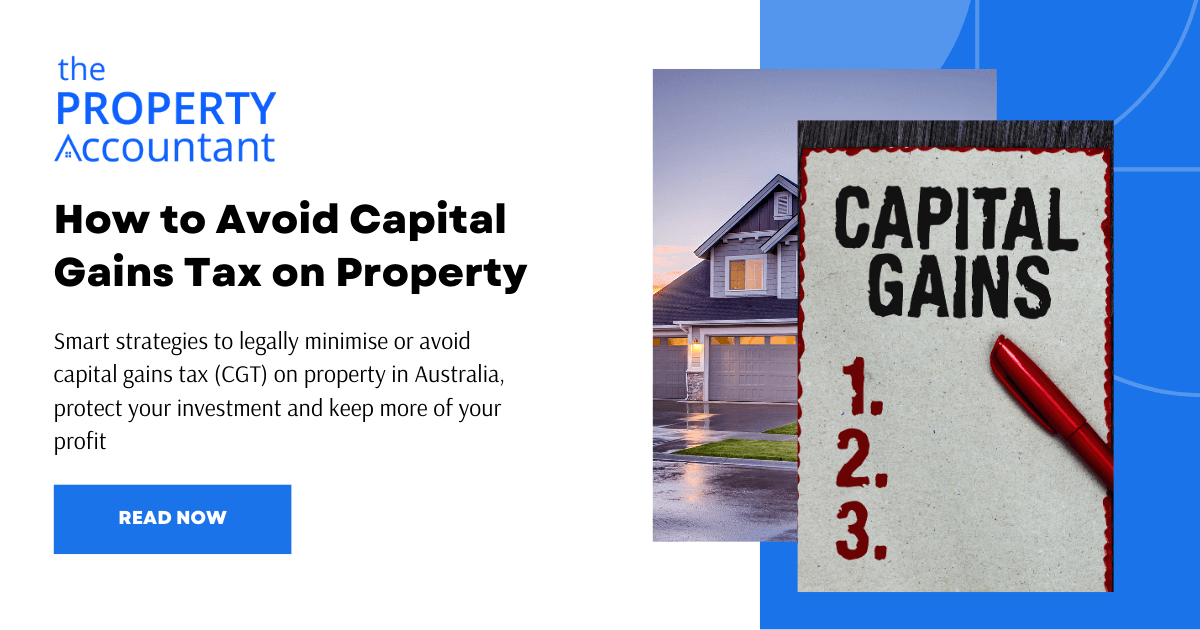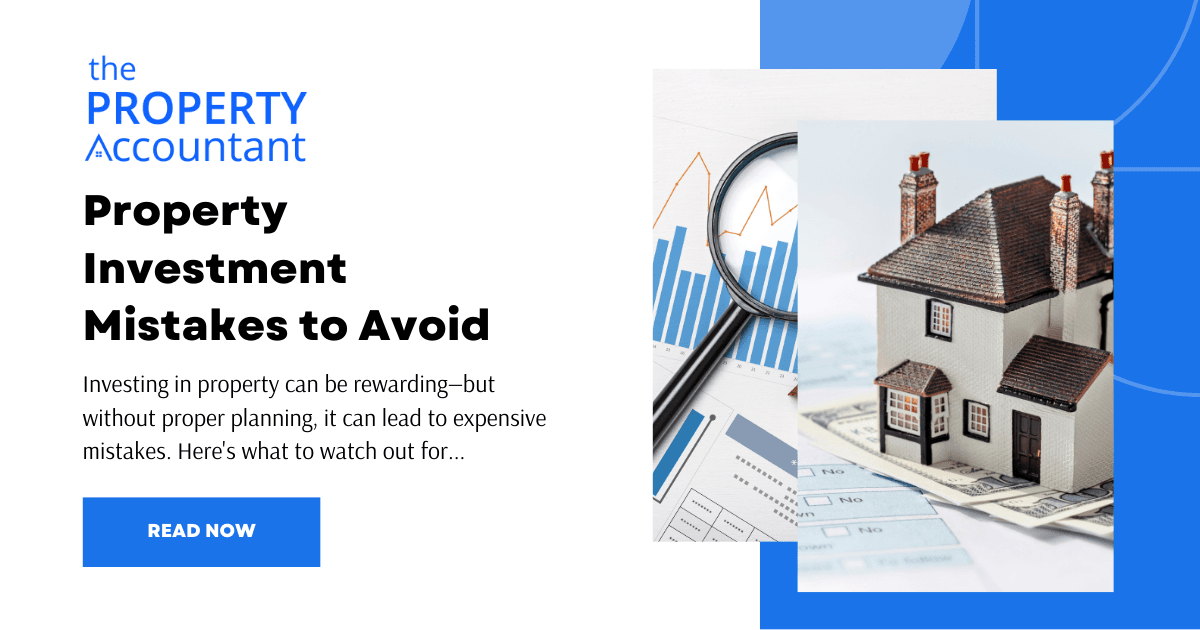Property Tax 101: Key Facts Every Australian Investor Should Know
Read Time: 9 minutes

Key Takeaways
- Understanding key facts about property tax can save Australian investors thousands of dollars.
- Stamp duty is a one-time tax paid to the state government when purchasing a property, typically ranging from 3% to 5% of the property value.
- Rental income is taxable, but deductible expenses such as maintenance costs, real estate agent fees, and depreciation can offset the tax liability.
- Depreciation on assets like buildings, cabinets, and flooring can be claimed to reduce taxable income; a quantity surveyor can prepare a depreciation schedule.
- Negative gearing occurs when property costs exceed rental income, allowing investors to offset the loss against their regular income.
Table of Contents
I would give everything to know the things I know now than what I knew 10 years ago. The more I learn about property tax, the more I can see that I lost thousands of dollars which could be saved.
Not to worry, because I have compiled the key facts from my experience that every Australian investor should know.
As they say, the more you know, the better. But it is important to know what is relevant rather than more.
Let me break everything down in a simple and clear way.
Stamp Duty Is the Real Deal
Whenever I buy a property, I will pay stamp duty on it. This is a very standard thing. It is a one-time amount to be paid to the state government.
Now, the rate will vary according to the location but it usually ranges from 3% to 5%.
For example, if I buy a $600,000 property, then I will pay around 4% on it. This comes out to be $20,000 roughly.
A Secret: If you buy a property for the first time as owner-occupied, you can get a stamp duty exemption unto a certain value of property.
Rental Income and Deductible Expenses
Most people buy property to put it on rent. Here's the catch. Having a property is not taxable, but renting your property is. The good news, I can claim deductions and save the money on that tax.
I can claim maintenance costs for the property, whatever I pay your real estate agent, all the wear and tear, and even depreciation on the building itself.
Instead of manually tracking everything, I use The Property Accountant, an innovative Mobile App and Web platform to streamline the process. It helps me categorize expenses, keep records in one place, and ensure I claim everything I'm entitled to come tax time.
Depreciation on the Property Can be Your Saviour
To save tax I always claim my depreciation. That's right, I can always save tax by saying that my property is a depreciating asset.
I can claim this on account of capital works, such as building, cabinets, flooring etc. And even in carpets and blinds. That might sound weird, but it works.
Here's a tip for you, get a quantity surveyor to prepare a depreciation schedule. I promise it's worth it.
Negative Gearing Is Not So Bad
If the costs associated with my property are more than my rental income, I have a negative gearing property. Let's just say, it is not bad after all.
For instance, if my rental income is $30,000 but my costs come to $40,000, I can offset the $10,000 loss against my regular income. Now, imagine you are in the 40% tax bracket then you will pay $4000 less in taxes (i.e., 10K loss X 40%). That is the discount I get on my taxes.
Understand The Land Tax
I have to pay land tax on my property on an annual basis. Now, whether I give the land tax or not, actually depends on the ownership structure and how much land is owned in each state.
In my opinion, if you are planning to buy a property, don't forget to evaluate how the different ownership structure impacts your land tax dues.
Capital Gains Tax Is Tricky
Yes, selling a property is also taxable. Capital gains tax is applied to the profit that you make while selling the property.
The good thing is, if I own the property for more than 12 months, I get a discount of 50%.
For example, if I get a profit of $100,000 on a property, I will get taxed on half of it. This is applicable if I have owned the property for more than a year.
Ownership Structures Matter
How I own my property impacts what taxes and how much tax I pay.
- Sole ownership: everything becomes simple, but I will have full tax responsibility.
- Joint Tenants: Everyone involved will have equal responsibility, and tax liability will be even.
- Tenants in common: So in this structure, I can distribute shares of the property to people. The tax they will pay will be decided on the basis of how much share they own.
- Trust or companies: This is by far the most complex, but I will be getting asset protection and tax benefits.
Main Residence Exemption
If I live in the property that I bought, then it will be considered as my primary residence. CGT or Capital Gains Tax will not be applied to this. Meaning, I will get to keep the profits when I sell it.
However, if I later rent it out, the exemption will be applied till the time I had the property listed as my primary residence.
Tax Planning is Important
Smart investors like me use tax planning strategies to minimize the tax bill.
For instance, I will likely sell the property in my low-income year to reduce CGT.
Or I will structure property ownership through trusts. In this way, I will distribute income more tax-effectively.
Borrowing Money to buy a Property
If I borrow money to invest it in a property, I will have to pay the mortgage. And surely I cannot rely on rental income to pay my mortgage.
To solve this, I can take interest-only loans, but here's the thing, the interest-only period will not last forever.
To buy a property through borrowed money, you need to be careful about the details. It is a good idea if you know what you are doing.
There are variable-rate loans, fixed-rate loans, and split-rate loans (these can be both fixed and variable), so do your full research before borrowing the money.
Determining Affordability
If I am even thinking of buying a property, I need to know where I stand. How much can I afford? Do I even have the balance to manage my expenses?
Let's break this down, I will have to pay at least a 5-10% deposit for the property. So I need to know if I can afford to pay for that.
If my deposit is less than 20% then the lender will ask me to pay the lender's mortgage insurance. In simple words, I will be borrowing more than 80% from the bank.
Factors to take care of when buying the property
Well, there are a lot of factors involved when buying a property. Here are some important ones:
- Location: Ideally I need to invest in a growing suburb. Because I would want to have a price growth on that property.
- Infrastructure: if I am planning to rent it out or even settle there, I need to know if there is good infrastructure there or not. Schools. Hospitals, restaurants, malls etc contribute to a good infrastructure.
- Demographic: I need to understand if the property really makes sense on the ground level. I would need to know whom to target according to the demographics of my property.
- Potential to add value: I would need to know if developing the property is worth it or not. Sometimes, when you renovate too much, it might cause a value decline. So I will plan my renovations and development accordingly.
Property Tax might seem haunting. But it is fun for me as I know how to deal with it. It is all about minimizing tax liability and maximizing returns.
However, I prefer working with an account. And I get maximum savings and I stay informed about the legislative changes. What do you think is important when you buy a property for investment?



